As a young Pacific Islander, working in the climate movement, something I have realized is the need for us to shift this single story that paints us as victims of
climate change, to one that reflects our multiple truths as Pacific
Islanders, living with climate impacts, but thriving nonetheless.
As a people, we need to retell our stories. We need to shed light on our multiple truths and record this part of our history, so the next generation can learn from our stories. Not just for the sake of Pacific Islanders in the climate discourse, but for Pacific Islanders in general.
The stories told to the world about us, have not been an accurate reflection of our unique Pacific perspectives, and that is why in my role 350.org Pacific Communications Coordinator, I paid close attention to story collecting and storytelling in 2015.
.
The stories collected across the region, represent our climate realities. It also represents the shared hope for the Pacific and the world. In 2015, I was part of a collective that took ownership of how our stories were being told to the world.
As a people, we need to retell our stories. We need to shed light on our multiple truths and record this part of our history, so the next generation can learn from our stories. Not just for the sake of Pacific Islanders in the climate discourse, but for Pacific Islanders in general.
The stories told to the world about us, have not been an accurate reflection of our unique Pacific perspectives, and that is why in my role 350.org Pacific Communications Coordinator, I paid close attention to story collecting and storytelling in 2015.
.
The stories collected across the region, represent our climate realities. It also represents the shared hope for the Pacific and the world. In 2015, I was part of a collective that took ownership of how our stories were being told to the world.
This collection of stories are our truths as a people at the front lines of climate
change. They are the stories of how we are bearing witness to climate
impacts as well as holding strong to the resilient spirits of our
people.
In 2015, the Pacific Climate Warriors blockaded the largest coal port in the world to send a direct message to the fossil fuel industry. In 2015,I helped organize teams across the Pacific region to travel throughout the Pacific to document stories of how climate change is destroying the Pacific way of life. Those stories were then woven into traditional mats that traveled to the Vatican to show leaders in Europe what is at risk if religious leaders do not divest from fossil fuels.
The hope was to also share those stories so that world leaders that met in Paris for COP21, would understand that for us in the Pacific, climate change is a question of survival, and they had to listen to the plight of the Pacific from our Pacific Leaders in Paris.
***
Frontline Truths: Fiji
Next, we travel to the Fiji islands where George Nacewa and the 350 Fiji team had travelled for roughly 12 hours to get to Vunisavisavi, a small village on the second major island in the Fiji group, Vanua Levu. Vunisavisavi was identified by the iTaukei Affairs Board (the administrative arm of the Government that looks after indigenous people of Fiji), as a community that may need to relocate due to the impacts of climate change. George spoke with a few villagers to understand their realities with climate impacts.Aisake Lovobalavu
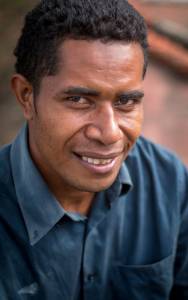 I
was born in Vunisavisavi, and I remember as a child playing so many fun
games in trees that grew by the beach. See that ‘Baka’ Tree, we used to
play in that tree years ago, back then the sea wasn’t as close to the
land as it is now. In those days, it was about 10 to 15 meters
out. Nowadays, its so close to the land, and its scary. Recently, we
just built a home by the beach. When we dug the holes for its
foundations and posts, seawater came rushing out of the earth. It is
taking over our land and causing a number of problems. Our septic tanks
are filled with seawater when the tide is in, the streams behind our
homes where we used to fetch drinking water from is all inundated by
seawater now, and our crops cannot grow anymore. On top of that, our
drinking water has been disrupted by the dry spell we are experiencing
so we need to limit the use of our remaining water pipes, only using it
for drinking, cooking and bathing.
I
was born in Vunisavisavi, and I remember as a child playing so many fun
games in trees that grew by the beach. See that ‘Baka’ Tree, we used to
play in that tree years ago, back then the sea wasn’t as close to the
land as it is now. In those days, it was about 10 to 15 meters
out. Nowadays, its so close to the land, and its scary. Recently, we
just built a home by the beach. When we dug the holes for its
foundations and posts, seawater came rushing out of the earth. It is
taking over our land and causing a number of problems. Our septic tanks
are filled with seawater when the tide is in, the streams behind our
homes where we used to fetch drinking water from is all inundated by
seawater now, and our crops cannot grow anymore. On top of that, our
drinking water has been disrupted by the dry spell we are experiencing
so we need to limit the use of our remaining water pipes, only using it
for drinking, cooking and bathing.I can tell you that even though these things are happening to us right now, we are not just sitting around waiting for these impacts to dictate our lives. We are doing what we can to ensure these impacts are dealt with.
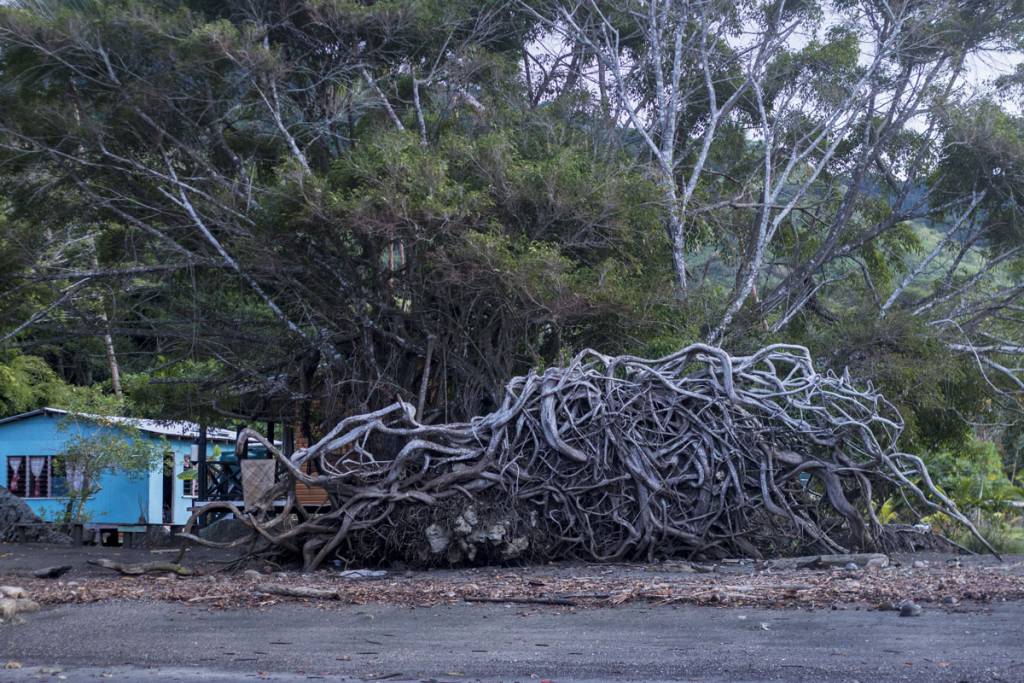
Filipo Bukadrokadroka
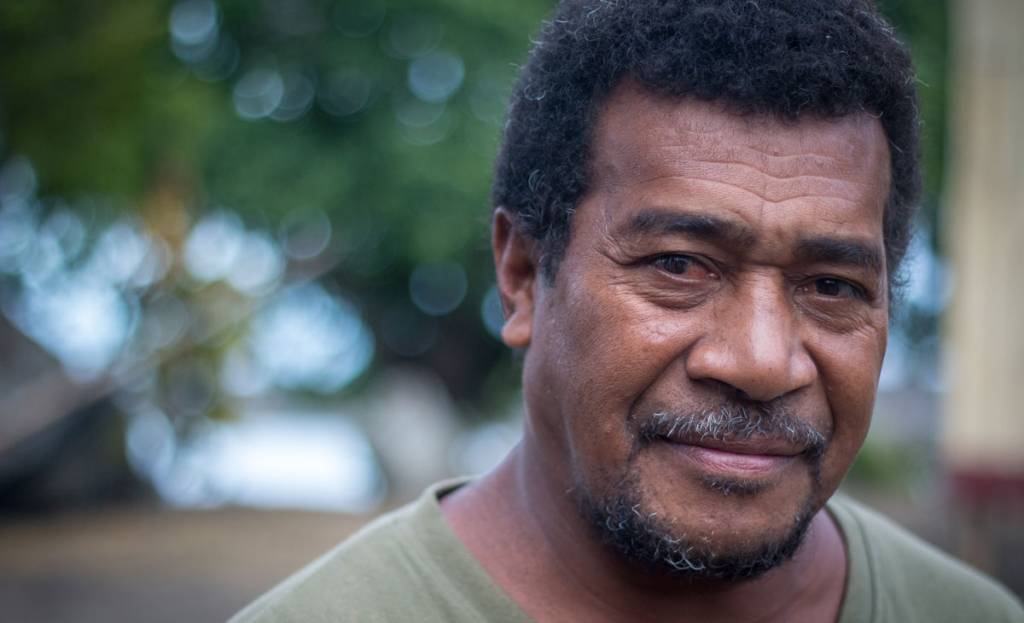
I am 47 years old, my entire life I have never seen the sea level as high as it is now. Now it comes right up to this ‘Kavika’ tree, this has never happened before. The stream on my left used to be where our elders fetched water for drinking and cooking, but now we can’t use it anymore because the sea has mixed with it.
This land that we are on is our ancestral ground. We are standing near the birthplace of the first paramount Chief of Cakaudrove, as the paramount chief the ‘Tui Cakau’ had asked my ancestors to remain here and watch over the land for him. We are still fulfilling that request till today and have come to love this place, even though a lot of people have come and advised us to leave because of the sea level rise, we cannot, this is the birthplace of our ancestors and where the foundation of our customs and traditions was built.
All we can do is continue to prepare ourselves to live with the impacts of climate change and hope that we get some assistance to protect our ancestral grounds from climate change.
Meredani Koso
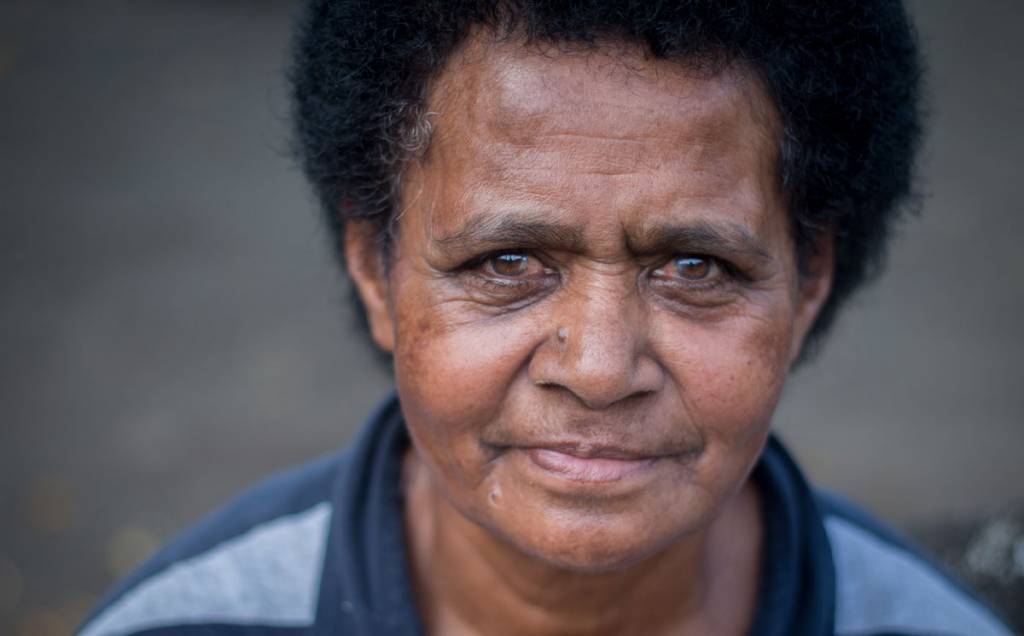
I am a retired school teacher, I taught for just a little under 40 years. My husband and I moved to Vunisavisavi, my husbands’ village, in 2012 to serve the people and look after the ancestral grounds. It is such a privilege to be back in Vunisavisavi after so many years teaching in different parts of Fiji, mainly because we get to educate the children and share the word of God.
When we moved back, my husband and I realized that we needed to build a concrete house to protect others and us from hurricanes, especially because we live so close to the sea. We also decided to build our home this way so children could come and use our tables and chairs, and have good enough lighting to do their homework in the evenings.
When I was working and earning money, we could afford to buy from the shops. Now that we have moved back here, my husband plants and we live off the land. In the village, the land plays an important role in helping provide for our needs. I told my husband that if our ancestors could survive off the land, so too could we. We may not have much, but what we have and get from the land we share, as this is who we are as a people.
When you live in the village, you realize that there is very little you need to buy from shops. From a coconut, for example, we can make cooking oil, body oil, and coconut milk and get fiber to make ropes. Everything we need to survive is right here, and we are blessed to have that. God has provided us with so many things and it’s important that we use that well, but climate change threatens this way of life, our traditional way of life.
Now we live off solar power, which is very convenient as it powers the electrical appliances we need. We only pay $18 a month and it is available around the clock, but not as noisy as the generator. The generator we used before was $20 a month with a time limit of 3 hours a night for usage. We are glad that we are using solar power, energy its most raw form.
If I have one message for you reading this, it would be to never forget who you are and where you belong. Always remember those of us here in villages that have the great responsibility of protecting our indigenous identity, keeping it alive through the protection of your ancestral ground. If you can help us, we welcome your assistance.
Kusitino Vodowaqa
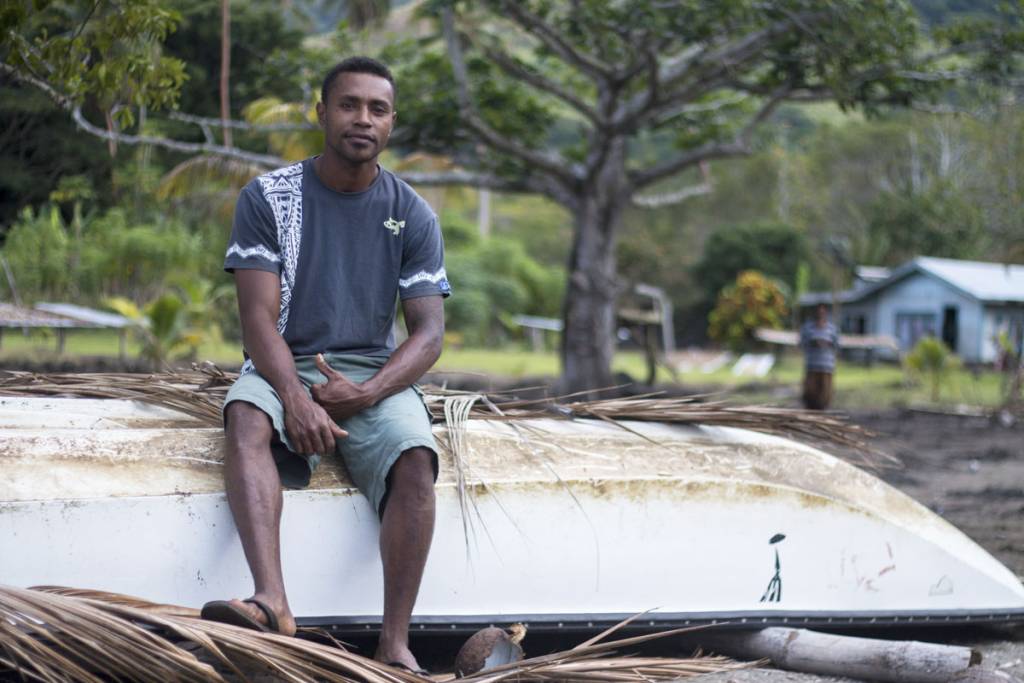
All the young people in Vunisavisavi are now working with the elders to build water catchments for our drinking water and also learn about the old ways. There aren’t a lot of young people in the village nowadays, but those that remain do what we must, to ensure the next generation will know the Vunisavisavi we know. Every day I think about the challenges the next generation will have to face because of the sea eating into our land. The rising seas always affect the homes beside the beach, we can’t plant food around the village anymore, and the change in weather is resulting in so many changes to our normal way of life.
Pio- Turaga Ni Koro
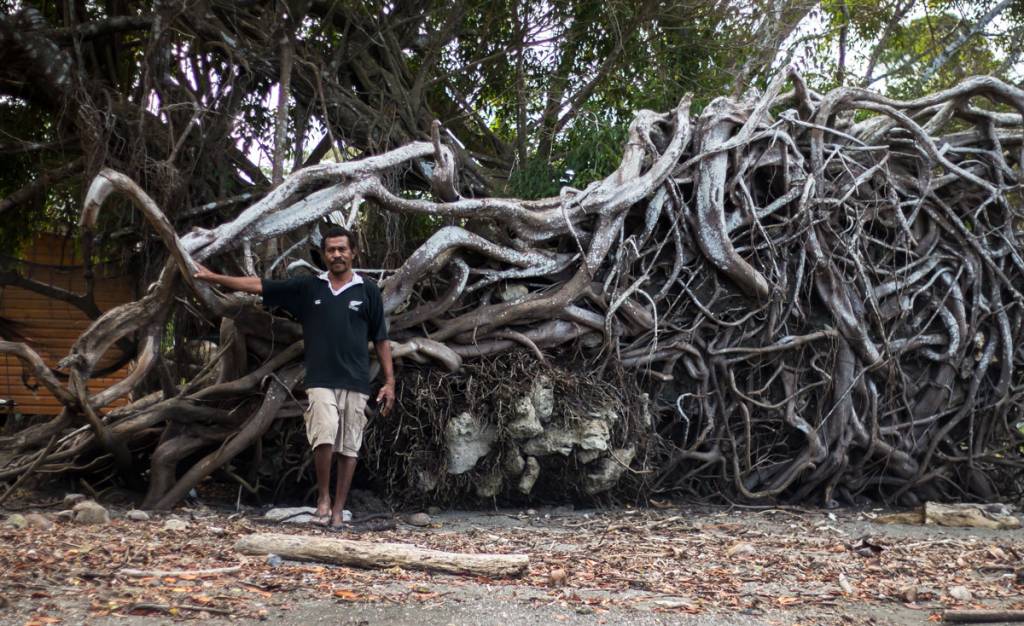
Before this place used to be rich with banana, breadfruit, and coconut trees, but in the past few years, we have seen that the trees have died and can’t bear any more fruit. The sea continuously keeps eating away at our land. These stones are all that remain from the barrier that surrounded the traditional home of the Tui Cakau. The rest have been swept away by the sea.
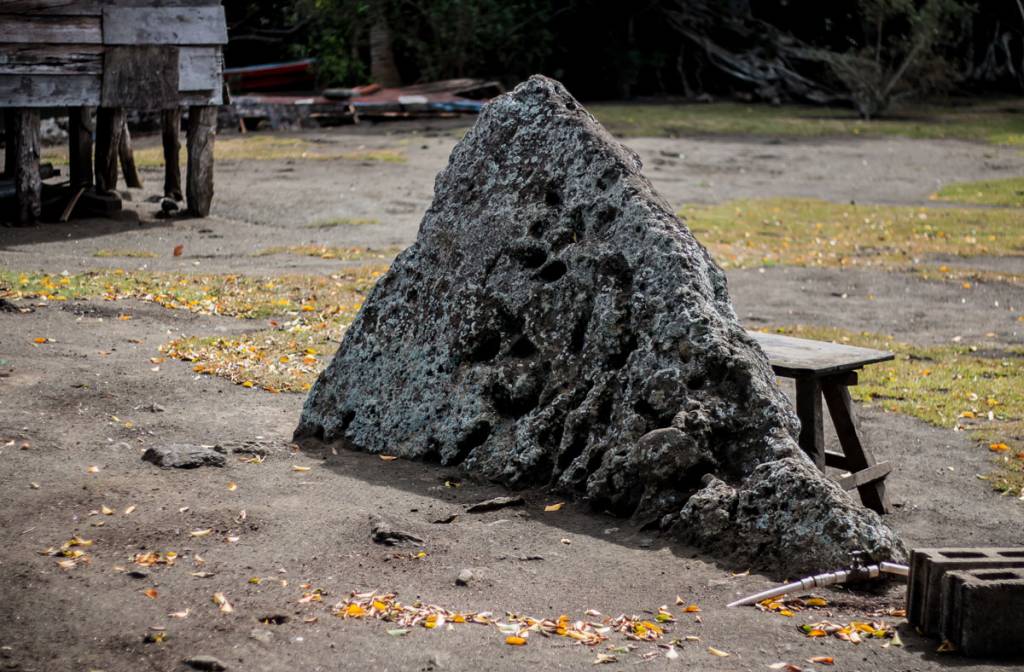
Iowane Tikoisuva
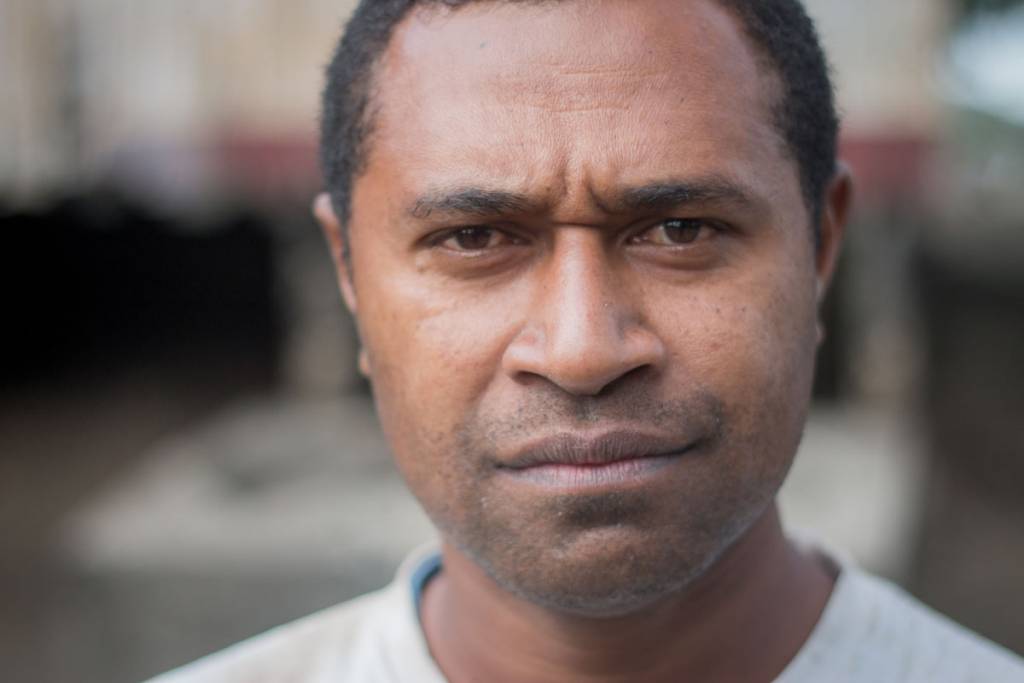
We have had to move into another home because the house that we used to live in is being torn apart by a combination of the rising sea and the weird weather we have been having. The original home we lived in was built on the ancestral ground of the Tui Cakau, but we have had to move from there because of the rising sea levels. However, the Tui Cakau has stated his intention to rebuild his bure (traditional resting home) on that piece of land again. Despite the threat posed by climate change, he believes in the ‘mana’ of the land and wants to live again on this land of his ancestors.
No comments:
Post a Comment